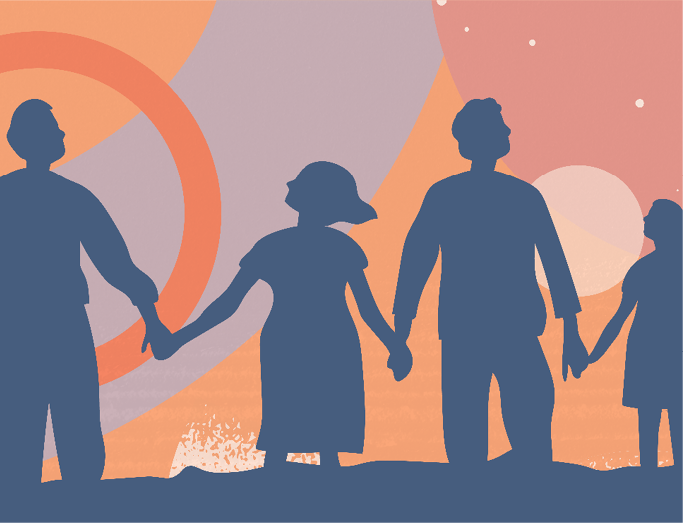In this Observatory Sighting, we explore acute, long-term and easily overlooked ‘deep-tissue’ damage resulting from relationship upheaval during lockdown and enforced separation. As we move towards the Out Turn, we must recognise and repair this damage.

We recently read a BBC article outlining the harm in reducing care-home visits for people with dementia. In this context, relationships were a literal lifeline. This begged a wider question:
Where has ‘deep-tissue’ damage – damage that is acute, long-term and easily overlooked – arisen from social distancing and separation?
In our Observatory conversations last year, contributors often remarked that they were missing relationships which they hadn’t noticed or fully appreciated in the past. Often, their absence – the removal of small talk in the queue, a friendly exchange in a shop, a chat with the hairdresser – dampened daily life by removing small and seemingly inconsequential sources of joy. But in other cases, the upheaval of relationships through enforced separation resulted in more acute, deep-tissue damage.
As we slowly move towards the Out Turn, we must turn our attention to recognising and repairing this deep-tissue damage.
Where have we seen deep-tissue damage?
Deep-tissue damage is hard to identify and even harder to quantify, but digging into various reports and evidence reveals the seriousness and breadth of the deep-tissue damage of the past year.
Healthcare: anguish, isolation and deteriorating health
When care-home visits were stopped or limited during lockdown, leading charities like Dementia UK and the Alzheimer’s Society called it a “hidden catastrophe”. They argued “enforced separation” was causing a deterioration in residents’ mental and physical health, particularly those – over 70% – living with dementia.
‘Family carers remain “essential members of the residents’ care and support network”, in providing practical services as well as being their “advocates, voice and memory”, and “keeping them connected to the world.”’
At that time there had been 5,404 excess deaths of people with dementia and Alzheimer’s disease in England and Wales during the pandemic – an increase of 52.2% versus the five-year average.
Cancer patients have also been affected by disrupted relationships. Macmillan describes the isolation, loneliness and stress of cancer patients forced to attend appointments and make decisions alone, and their anguish and loss of hope as support relationships were cut. Other research found:
“A significant number of oncology patients are experiencing loneliness, most likely as a result of mandated social distancing and isolation procedures. The symptom burden of these patients is extremely high and warrants clinical evaluation and interventions.”
Increased symptom burden – the subjective sum of the severity and impact of symptoms of a given condition – is no less serious just because it exists in the shadow of an overarching cancer diagnosis that in and of itself remains unchanged.
Domestic abuse: increasing severity and calls for help
Lockdown has increased reports of domestic abuse and requests for help. Between April and June 2020, research found an 8.1% increase in abuse from current partners and a 17.1% increase from family members, although a decline of 11.4% from former partners. The same period saw a 65% increase in calls to the National Domestic Abuse Helpline, versus January to March.
These increases might reflect increasing severity and a lack of escape from abuse during lockdown, rather than increasing cases per se, but the consequences remain severe. In April 2020, the Home Affairs Committee said there was “evidence that cases are escalating more quickly to become complex and serious, with higher levels of physical violence and coercive control.”
“91% of respondents currently experiencing domestic abuse said the Covid-19 pandemic had negatively impacted in at least one way. Of those women living with their abuser during lockdown, 61% said the abuse had worsened. More than two-thirds (68%) said they felt they had no one to turn to during lockdown.”
Growing need also came amidst reducing service provision. Women’s Aid found that between 23rd March and 31st May 2020 there was a 40.6% reduction in refuge vacancies in England versus 2019 due to the pandemic.
Children: unhappiness, violence and severed support
In forcing school closures, the pandemic has transformed relationships – with friends, family and support services – integral to children’s wellbeing, causing likely deep-tissue damage that is particularly serious for vulnerable children and families.
Save the Children found that children (internationally) unable to see friends are less happy, more worried and less safe. The research also found children are more likely to be subject to violence or negativity at home during the pandemic, with domestic violence reports by children over doubling during school closures.
“For many children and young people, school acts as a protective factor and at the most basic level as childcare and a safe place to be during the day.”
School closures are particularly severe for families with no recourse to public funds (NRPF), for whom schools offer access to support, advocacy and free school meals that families can’t get elsewhere. More generally, children have suffered as the pandemic has disrupted relationships with support services – particularly children of refugees or asylum seekers, who rely disproportionately on advice and advocacy to access their rights and entitlements, and are less likely to have resources to fall back on. As well as mental health problems, a lack of communication from services leaves families more likely to accidentally break Home Office rules.
Stripped-back services have also endangered separated children and young people, depriving them of critical support, routine and stability:
“Youth groups and advocacy services in different regions provide a lifeline to young people with no family in the UK – as children and young people will no longer be able to attend these services or drop-ins in person because of reduced services or as per government ‘social distancing’ advice, it is likely that many will feel isolated or unsupported and at increased risk of mental health crisis.”
Young carers are similarly vulnerable. The pandemic is creating more young carers just as local authorities have been released from their statutory duties to young carers. To compound matters:
“Teachers and support staff are often the most trusted and important professional relationship in a young carer’s life. Young carers are more likely to be identified through their school compared to health services.”
Prisons: increased suicide risk and strained family relationships
A prisoner who successfully sustains a family relationship is 39% less likely to reoffend than one who doesn’t.
Strong family relationships are vital for many prisoners, including remand prisoners. But the pandemic has made it even more difficult than normal. The Centre for Social Justice has outlined how, with scarce internet access (only 18 of 117 UK prisons even have in-cell cabling), reduced calls, no visits and prison social life being placed on hold, prisoners’ relationships are breaking down.
Qualitative research based on prisoner interviews back this up, with relationships emerging as a prominent theme.
“This situation is destroying my relationship with my partner and I feel my daughter is becoming slightly cold with me … Contact with family is difficult in prison at the best of times, this has made it harder.”
With already huge suicide and recidivism, what are the costs to prisoners? The clues are bleak, including an increase in the number of prisoners placed on suicide watch during the pandemic.
This all impacts prisoners’ children, too. Dr. Shona Minson of Oxford University argues that many prions effectively stopping visits for twelve months amounts to an interference with children’s right to family life, impacting their physical and mental wellbeing and causing feelings of confusion and even culpability.
“The effects of this loss of contact and disruption to family relationships are likely to be long term and will affect family reunification and resettlement after imprisonment.”
Homelessness: increased demand driven by relationship breakdown
Crisis reports that homelessness and demand for services have increased during Covid. 53% of services surveyed reported an increase in homelessness, with 73% stating demand for their services had increased.
Relationship breakdown between partners and wider families, coupled with increased time off work and redundancy, was highlighted by services and local authorities as an increasing driver.
UK government policies – including emergency housing, pausing evictions and temporarily uplifting Local Housing Allowance – have limited abject destitution. But support services generally have been stripped back, as this qualitative research on a homelessness and addiction support service in Scotland depicts. And whereas these policies are temporary, relationship breakdown and the harm of being homeless will be longer term.
An invitation
- Does the concept of deep-tissue damage resonate
- What other examples of deep-tissue damage have you seen
- Who is – and how can – we respond?
We’d love to hear your thoughts. Please get in touch: hello@relationshipsproject.org
Read more

Doing what anyone would do
Days after the Prime Minister launched a bold new Civil Society Compact, the Health secretary announced a major public consultation on the future of the NHS and the Chancellor introduced a budget that squeezed frontline services in the short term, invested in the...

Honouring, celebrating and exploring the voices of young people
In brief On 27th July 2022, we co-hosted an event with Save the Children to celebrate and explore the stories that young people shared with us through The Lookout. We were joined by two of our Chief Listeners - Mete Coban and Kirsty McNeil - who shared their...
